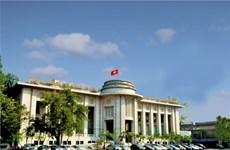Cabinet meets to discuss economy
Vietnam’s economy made a robust recovery and grew at 6.78 percent in
2010 despite difficulties and challenges after the global economic
crisis.
Vietnam ’s economy made a robust recovery and grew at 6.78 percent in
2010 despite difficulties and challenges after the global economic
crisis.
The comment was made by cabinet members at their monthly meeting chaired by Prime Minister Nguyen Tan Dung in Hanoi on December 29.
The single-day meeting focused on reviewing the country’s socio-economic performance in 2010 and outlining ways to deploy plans for 2011 along with other issues.
All sectors and branches posted a growth rate that was higher than 2009, with agriculture, forestry and fisheries expanding 2.78 percent, industry and construction, 7.7 percent, and the service sector, 7.52 percent.
In the year, the production value of agriculture and forestry increased 4.7 percent and that of the industrial sector rose 14 percent while retail sales and consumption services surged 24.5 percent.
Export earnings hit 71.6 billion USD, representing a 25.5 percent soar, foreign investment reached 11 billion USD and social investment was up by 17.1 percent.
The country received as many as 5 million foreign visitors in the year.
Recognising these encouraging efforts, the cabinet members were still concerned about an 11.75 percent rise in consumer price index.
They recommended that the government’s direction and management be strengthened to ensure macroeconomic stability, promote production and business, and safeguard social welfare.
They agreed that the government needs to highly concentrate on carrying out all adopted solutions to put inflation under control, stabilise macro-economy and secure market stability.
The cabinet members also suggested that more investment be pumped into agriculture and rural areas, focusing on vocational training, job generation and healthcare.
To conclude the meeting, Prime Minister Nguyen Tan Dung asked ministries and agencies to drastically implement all outlined solutions, focusing on stabilising macro-economy and reining in inflation, targeting a growth rate of over 7 percent in 2011.
The PM reminded the State Bank of Vietnam to learn from its mistakes in executing the monetary policy in order to better control the payment instruments and credits as well as manage the developments in foreign exchange and gold markets.
He asked ministries and sectors to enhance inspection and surveillance over development investment and hasten construction tempo of major works to put them into operation on schedule.
To continue undertaking administrative reforms effectively and fighting corruption, PM Dung laid stress on information and communication work.
He called on the government officials to proactively publicise information and have dialogues on the mass media to help the people grasp thoroughly the State’s policies and plans, thus creating consensus in the country for the promotion of national socio-economic development./.
The comment was made by cabinet members at their monthly meeting chaired by Prime Minister Nguyen Tan Dung in Hanoi on December 29.
The single-day meeting focused on reviewing the country’s socio-economic performance in 2010 and outlining ways to deploy plans for 2011 along with other issues.
All sectors and branches posted a growth rate that was higher than 2009, with agriculture, forestry and fisheries expanding 2.78 percent, industry and construction, 7.7 percent, and the service sector, 7.52 percent.
In the year, the production value of agriculture and forestry increased 4.7 percent and that of the industrial sector rose 14 percent while retail sales and consumption services surged 24.5 percent.
Export earnings hit 71.6 billion USD, representing a 25.5 percent soar, foreign investment reached 11 billion USD and social investment was up by 17.1 percent.
The country received as many as 5 million foreign visitors in the year.
Recognising these encouraging efforts, the cabinet members were still concerned about an 11.75 percent rise in consumer price index.
They recommended that the government’s direction and management be strengthened to ensure macroeconomic stability, promote production and business, and safeguard social welfare.
They agreed that the government needs to highly concentrate on carrying out all adopted solutions to put inflation under control, stabilise macro-economy and secure market stability.
The cabinet members also suggested that more investment be pumped into agriculture and rural areas, focusing on vocational training, job generation and healthcare.
To conclude the meeting, Prime Minister Nguyen Tan Dung asked ministries and agencies to drastically implement all outlined solutions, focusing on stabilising macro-economy and reining in inflation, targeting a growth rate of over 7 percent in 2011.
The PM reminded the State Bank of Vietnam to learn from its mistakes in executing the monetary policy in order to better control the payment instruments and credits as well as manage the developments in foreign exchange and gold markets.
He asked ministries and sectors to enhance inspection and surveillance over development investment and hasten construction tempo of major works to put them into operation on schedule.
To continue undertaking administrative reforms effectively and fighting corruption, PM Dung laid stress on information and communication work.
He called on the government officials to proactively publicise information and have dialogues on the mass media to help the people grasp thoroughly the State’s policies and plans, thus creating consensus in the country for the promotion of national socio-economic development./.













